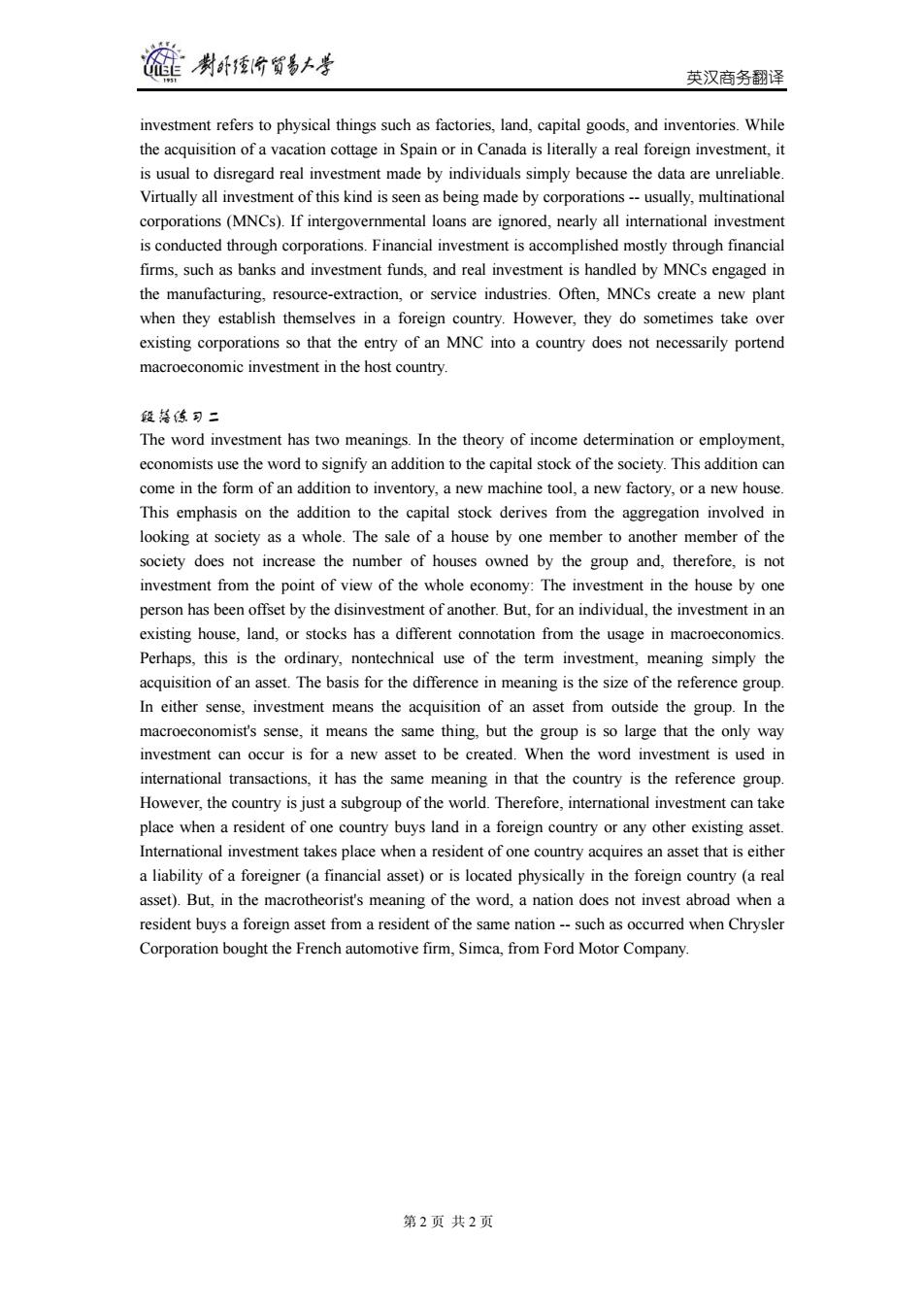正在加载图片...

制卧价贸易上兰 英汉商务翻译 investment refers to physical things such as factories,land,capital goods,and inventories.While the acquisition of a vacation cottage in Spain or in Canada is literally a real foreign investment,it is usual to disregard real investment made by individuals simply because the data are unreliable. Virtually all investment of this kind is seen as being made by corporations--usually,multinational corporations(MNCs).If intergovernmental loans are ignored,nearly all international investment is conducted through corporations.Financial investment is accomplished mostly through financial firms,such as banks and investment funds,and real investment is handled by MNCs engaged in the manufacturing,resource-extraction,or service industries.Often,MNCs create a new plant when they establish themselves in a foreign country.However,they do sometimes take over existing corporations so that the entry of an MNC into a country does not necessarily portend macroeconomic investment in the host country. 段荟练习二 The word investment has two meanings.In the theory of income determination or employment, economists use the word to signify an addition to the capital stock of the society.This addition can come in the form of an addition to inventory,a new machine tool,a new factory,or a new house. This emphasis on the addition to the capital stock derives from the aggregation involved in looking at society as a whole.The sale of a house by one member to another member of the society does not increase the number of houses owned by the group and,therefore,is not investment from the point of view of the whole economy:The investment in the house by one person has been offset by the disinvestment of another.But,for an individual,the investment in an existing house,land,or stocks has a different connotation from the usage in macroeconomics. Perhaps,this is the ordinary,nontechnical use of the term investment,meaning simply the acquisition of an asset.The basis for the difference in meaning is the size of the reference group. In either sense,investment means the acquisition of an asset from outside the group.In the macroeconomist's sense,it means the same thing,but the group is so large that the only way investment can occur is for a new asset to be created.When the word investment is used in international transactions,it has the same meaning in that the country is the reference group. However,the country is just a subgroup of the world.Therefore,international investment can take place when a resident of one country buys land in a foreign country or any other existing asset. International investment takes place when a resident of one country acquires an asset that is either a liability of a foreigner(a financial asset)or is located physically in the foreign country (a real asset).But,in the macrotheorist's meaning of the word,a nation does not invest abroad when a resident buys a foreign asset from a resident of the same nation--such as occurred when Chrysler Corporation bought the French automotive firm,Simca,from Ford Motor Company. 第2页共2页英汉商务翻译 investment refers to physical things such as factories, land, capital goods, and inventories. While the acquisition of a vacation cottage in Spain or in Canada is literally a real foreign investment, it is usual to disregard real investment made by individuals simply because the data are unreliable. Virtually all investment of this kind is seen as being made by corporations -- usually, multinational corporations (MNCs). If intergovernmental loans are ignored, nearly all international investment is conducted through corporations. Financial investment is accomplished mostly through financial firms, such as banks and investment funds, and real investment is handled by MNCs engaged in the manufacturing, resource-extraction, or service industries. Often, MNCs create a new plant when they establish themselves in a foreign country. However, they do sometimes take over existing corporations so that the entry of an MNC into a country does not necessarily portend macroeconomic investment in the host country. 段落练习二 The word investment has two meanings. In the theory of income determination or employment, economists use the word to signify an addition to the capital stock of the society. This addition can come in the form of an addition to inventory, a new machine tool, a new factory, or a new house. This emphasis on the addition to the capital stock derives from the aggregation involved in looking at society as a whole. The sale of a house by one member to another member of the society does not increase the number of houses owned by the group and, therefore, is not investment from the point of view of the whole economy: The investment in the house by one person has been offset by the disinvestment of another. But, for an individual, the investment in an existing house, land, or stocks has a different connotation from the usage in macroeconomics. Perhaps, this is the ordinary, nontechnical use of the term investment, meaning simply the acquisition of an asset. The basis for the difference in meaning is the size of the reference group. In either sense, investment means the acquisition of an asset from outside the group. In the macroeconomist's sense, it means the same thing, but the group is so large that the only way investment can occur is for a new asset to be created. When the word investment is used in international transactions, it has the same meaning in that the country is the reference group. However, the country is just a subgroup of the world. Therefore, international investment can take place when a resident of one country buys land in a foreign country or any other existing asset. International investment takes place when a resident of one country acquires an asset that is either a liability of a foreigner (a financial asset) or is located physically in the foreign country (a real asset). But, in the macrotheorist's meaning of the word, a nation does not invest abroad when a resident buys a foreign asset from a resident of the same nation -- such as occurred when Chrysler Corporation bought the French automotive firm, Simca, from Ford Motor Company. 第 2 页 共 2 页